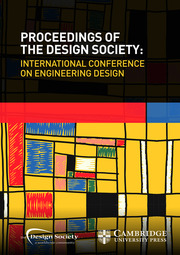Article contents
Estimating the Impact of Design Automation: The Influence of Knowledge on Potential Estimation
Published online by Cambridge University Press: 26 July 2019
Abstract
Assessing the impact of design automation on design practice prior to its implementation is difficult and subject to uncertainties. One reason for this is the designers' lack of knowledge about design automation. In this work, an industrial case study focusing on conceptual design of hydraulic circuits is conducted to assess the impact of the designers' knowledge on design automation potential estimation. In particular, the impact of demonstrating a prototypical implementation of a design automation application is investigated as a means to enhance the designers' knowledge about design automation. In this respect, a given set of metrics is rated twice to enable a comparative study: prior to and after introducing the design automation prototype. The yielded results show that the knowledge impacts the rating and supports reliability of potential estimation. Further, it is shown that designers acknowledge design automation potential for the early stages of design given sufficient knowledge about design automation. Yet, the results also indicate that careful attention needs to be put on the aspects covered by the prototype in order to avoid biasing participants.
Information
- Type
- Article
- Information
- Proceedings of the Design Society: International Conference on Engineering Design , Volume 1 , Issue 1 , July 2019 , pp. 1943 - 1952
- Creative Commons
- This is an Open Access article, distributed under the terms of the Creative Commons Attribution-NonCommercial-NoDerivatives licence (http://creativecommons.org/licenses/by-nc-nd/4.0/), which permits non-commercial re-use, distribution, and reproduction in any medium, provided the original work is unaltered and is properly cited. The written permission of Cambridge University Press must be obtained for commercial re-use or in order to create a derivative work.
- Copyright
- © The Author(s) 2019
References
- 2
- Cited by

